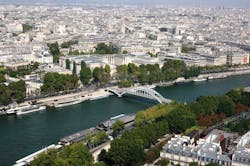Paris plans to transform the right bank of the river Seine into car-free pedestrian zone
On Sundays and for a majority of the summer, the Voie Georges Pompidou closes to cars between the Louvre museum and the Place de la Bastille area, allowing the space to instead be used for pedestrians. However, as Reuters reports, this stretch of highway on the right bank of the river Seine will not be reopening this year, as Paris has plans to permanently transform the area into a riverside park.
The banks of the Seine were designated a UNESCO World Heritage site and, the right bank specifically, runs past some of the city’s major landmarks, such as the Ile de la Cite, Notre Dame and Paris city hall.
The plans to close the highway stem from a goal to reduce pollution caused by motor traffic in the city. The highway was built in the 1960s and brought cars to a place were they never were before, increasing pollution and taking up valuable space that could otherwise be used for pedestrians.
While the goal of reducing pollution is admirable, many people are worried that the move will just increase congestion and pollution in other areas of the city. Some restaurant owners on the right bank worry that closing the highway will negatively affect their businesses, fearing traffic will be forced from the road by the river and up to the streets outside their restaurants, becoming a nuisance for people on the terraces.
Paris’s Deputy Mayor, however, says the city just needs time to adjust to the change and the increased local traffic will be temporary as people find and grow accustomed to new ways to reach their destinations.
The left bank highway has been closed to cars between the Musee d'Orsay and the Eiffel Tower since 2013. The area has become a popular park featuring outdoor cafes and sports facilities. Paris city officials hope closing the right bank to traffic will produce similar results.
